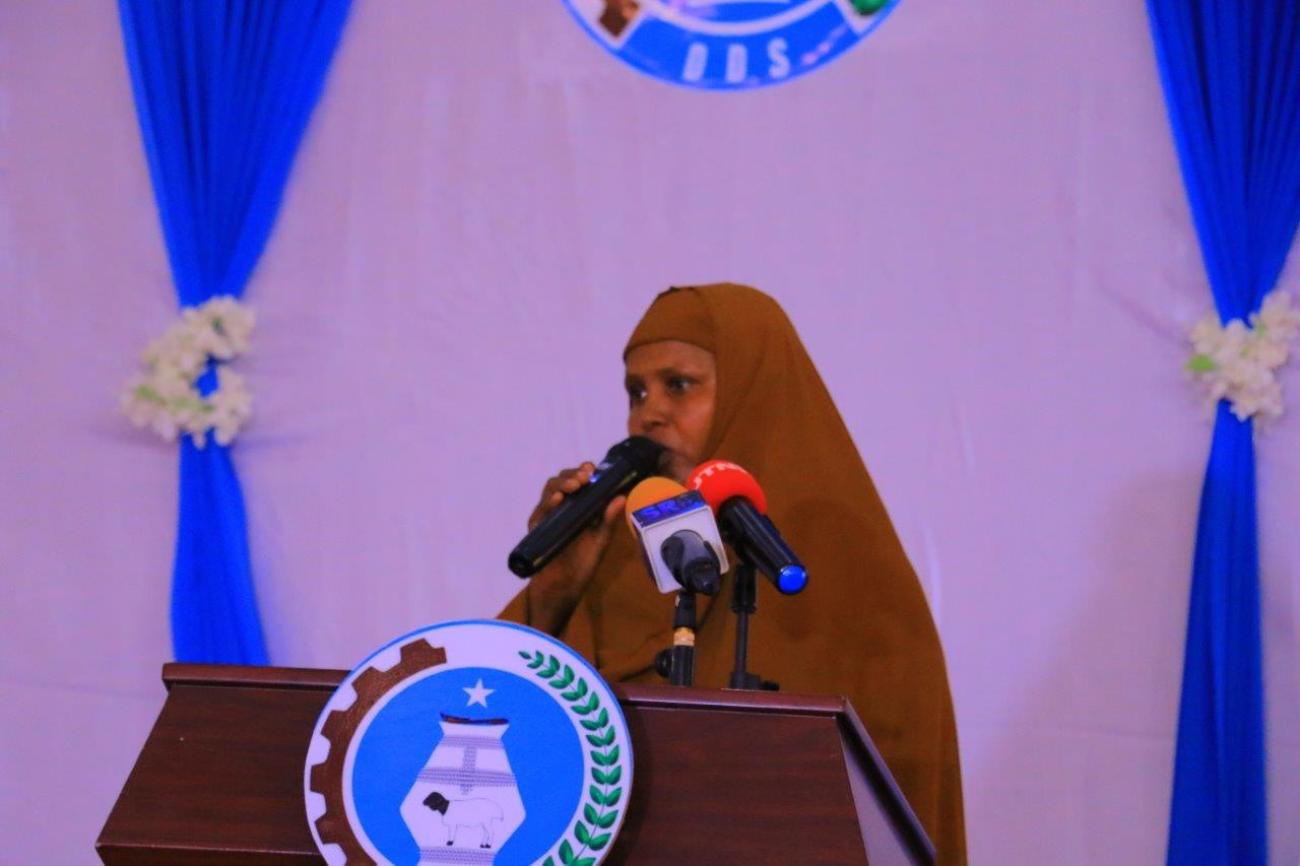Durable Solutions for Internally Displaced Persons

A three-year durable solutions strategy was launched in the drought-affected Somali region in the south of Ethiopia.
Nimu Mohammed, 45, and a mother of nine children, was forced to displace to Kebrebeyeh District, Somali Region, as the effects of the severe drought in the region continued unabated. Nimu lost her entire livestock and had left with no other livelihood options when her village did not get rain that was essential for her livestock and members of the communities like Nimu.
“After losing all my livelihoods, I decided to leave my village (Shekoys District) with my three younger children, leaving behind other six. Members of the community in Kebrebeyeh welcomed us. They are also sharing with us what they have. However, the challenges of the drought are beyond the capacity of our host community. We need food, water and other essential supplies immediately. We also want to have long-term solutions. We don’t want to live like this.”
Another internally displaced woman, Dalbile Mohammud, who took a shelter in Gabicas IDPs. Dalbile,50 years, a mother of three, didn’t know what the future holds for her and her families. “We are struggling here with all sorts of challenges, including inadequate supplies of food and non-food items”. While Dalbile and other IDPs in the Gabicas IDPs site are heavily impacted by the drought, they are also in dilemma to welcome the rain, fearing flash floods that will do more harm. “We need the rain to go back to our homes, but heavy rain is also our concern. These temporary shelters can’t protect us from heavy rains or floods.”
In Somali Region, drought has significantly increased humanitarian needs and has led to a growing number of internally displaced people in addition to those impacted by the previous conflicts in the region. Prior to the drought, draft data from IOM DTM indicated over 870,000 protracted IDPs living in the region.
After being forced to leave their homes due to drought or conflict, many people like Nimu, Dalbile and hundreds of thousands of people in the Somali Region have found themselves in a difficult situation that needs durable solutions.
While addressing the immediate needs of IDPs and vulnerable host communities, the Somali Region and the UN as well as donors and partners have sought long-term solutions to the multi-faced challenges of IDPs. The efforts led to the development of a three-year durable solutions strategy that will help tackle the adverse impact of internal displacement in a sustainable manner.
The strategy aims to reach more than 100,500 households and 603,000 internally displaced persons (IDPs) in the area.
Led by the regional government, which has committed to including durable solutions activities in its budget, and supported by the UN, the strategy which was launched 24 May was welcomed by donors.
Among others, Ambassadors of Finland, Germany, Japan, Sweden and Switzerland, Deputy Ambassador of the Czech Republic, and representatives of the European Union and USAID, attended the launching ceremony.
According to the displacement tracking matrix of the International Organization for Migration, currently, Ethiopia has one of the highest numbers of IDPs globally – 4.5 million persons with close to 1 million in Somali, the largest number displaced in a single region in the country. The strategy will support the IDPs to sustainably rebuild their lives.
The IDP representative, Tarik Dullane, Head of Qoloji IDPs Women’s Committee, stressed that to restart their lives in dignity, they needed durable solutions. “Humanitarian assistance is not an option,” she said.
Meanwhile, UN Resident and Humanitarian Coordinator in Ethiopia, Dr. Catherine Sozi, explained that successful implementation would be achieved if internal displacement was also recognized as a priority for development and peace.
“This is achievable if we go beyond treating internal displacement as just a humanitarian problem and recognize it as a priority for development and peace.”
“Intervention in support of durable solutions need to address governance, infrastructure, social cohesion, security, and risk reduction components. They are all are essential for achieving solutions at scale and for supporting the achievement of the sustainable development goals,” Dr. Sozi said.
In his opening statement at the launch of the strategy, President of Somali Regional State of Ethiopia, Mr. Mustafe M. Omer, said, "The strategy will serve as an instrument to advance durable solutions to both conflict and climate-induced internally displaced persons (IDPs) as well as vulnerable host community members."
Support of international Partners
International partners were very supportive of the Somali Region Durable Solutions Strategy.
Ms. Tamara Mona, Ambassador of Switzerland to Ethiopia, noted that the Somali Region Durable Solutions Strategy is a step forward in the development of holistic, whole-of-government, and whole-of-society approach in finding dignified and sustainable solutions for IDPs.
Mr. Stefan Auer, Ambassador of Germany to Ethiopia, commended Somali Region for developing a durable solutions strategy and expressed Germany’s interest to strengthen sustainable solutions in the humanitarian-peace-development nexus.
Ms. Takako Ito, Ambassador of Japan to Ethiopia, expressed support for the Somali Region Durable Solutions Strategy and underscored the importance of transitioning from humanitarian to development to save the lives of people.
Mr. Hans Henric Lundquist, Ambassador of Sweden to Ethiopia, noted that informed and voluntary return, relocation and local integration as well as support for households to make individual decisions are crucial for achieving durable solutions for Internally Displacement Persons.
Ms. Outi Holopainen, Ambassador of Finland to Ethiopia, underlined the need to ensure the most vulnerable including women and children and people with disability are at the center when implementing the durable solution strategy for Somali Region.
Ms. Sarah Berry, representing USAID Ethiopia, commended the Somali Region for developing the strategy that embraces the principles of dignified, safe and voluntary solutions for internally displaced persons.
Ms. Sarah Buzzoni, representing the European Union in Ethiopia, expressed support to the durable solutions strategy for Somali Region, as the region has been facing drought and other natural disasters.

















